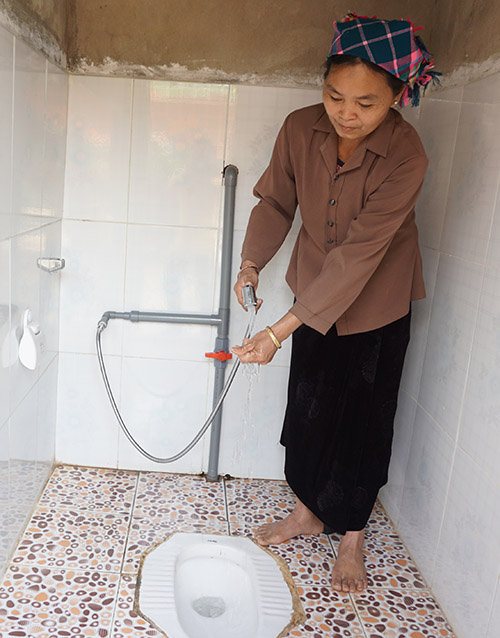Stories of Change

Lo Thi Cay cleans her new latrine.
Last year, our team in Vietnam helped 21 communities get certified as Open Defecation Free.
Source: Annual Report 2017
For almost 20 years, we didn’t know this basic information.
Lo Thi Cay isn’t among the poorest people in her remote village in northern Vietnam’s Than Uyen district. Her family has some land for rice farming, a few pigs to raise for eventual sale and a small fish pond that adds income when fish grow large enough to catch and sell. They own a clean, well-kept brick house, which was built in line with age-old customs and lifestyles among the Thai people who have lived in the area for more than 20 years.
Based on those customs, though, Cay’s family home doesn’t have a bathroom and toilet. Every day, she, her husband and their daughter go to a nearby stream nearby for bathing and toileting. Imagine doing both those things in the same water! But, to Cay and her neighbors this is just a normal part of daily life.
CWS, in partnership with the Vietnamese government and the Evangelical Lutheran Church in America, identified Cay’s village as one that needed extra support on hygiene and sanitation practices. Our team held an information session on hygiene and sanitation at the community house. Cay and other participants saw graphic, real life examples of ways that bathing and toileting in the same place are bad for their families’ health.
Suddenly, Cay understood the situation much better. She told us, “After attending the CWS-hosted gathering at the community house, I felt so disgusted about the unsanitary situation I was part of, I was determined to build a toilet for my family.” Along with the other households in the village, Cay’s family installed a toilet in January. Cay’s family went one step further and used some of their resources to build a bathing room next to their toilet.
“For nearly 20 years, my daughter, husband and I have gone to the stream for open bathing and toileting. I didn’t like this as I knew, somehow, that it was not safe. But, we did it because we had no bathroom to use – not even information about a better way! But now, after CWS friends visited, my husband understood how to live in a healthier way, and he agreed to build the bathroom and toilet. I am so excited to have these,” Cay said.
The CWS program here that partners with ethnic minority communities is called NEW IDEA, which stands for New Integrated Development and Essential Action. This CWS-ELCA program came to Cay’s village, Na Dan #1, in September as part of our Community-Led Total Sanitation model. Within four months, all 68 households had new hygienic latrines and the village is recognized as an Open Defecation Free community. This designation is a very important one in rural Vietnam, and it’s a point of pride for the community members. Clearly, hundreds of people have better protected health now because of the teamwork the project has engendered to contribute positively in changing knowledge, awareness and behavior in rural Vietnam.
